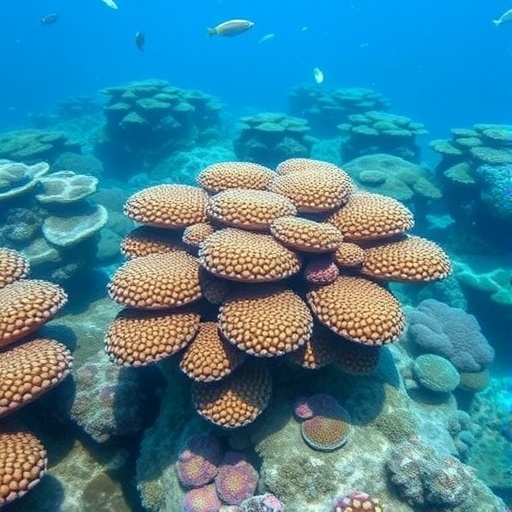In the annals of climate impact on marine ecosystems, the year 2023 will be remembered as a catastrophic turning point for Florida’s Coral Reef (FCR). An unprecedented marine heatwave, peaking at a searing 32.3 degrees Celsius in July 2023, has wrought irreversible damage on the reef’s critically endangered Acropora coral species—namely Acropora palmata (elkhorn coral) and Acropora cervicornis (staghorn coral). This heat stress event has precipitated what researchers label as the functional extinction of these cornerstone reef-building corals in Florida’s waters, marking the end of a 250,000 to 500,000-year legacy for these species in the Caribbean.
The study, conducted by Derek Manzello and colleagues, undertook a comprehensive and systematic assessment spanning the entire ~560-kilometer stretch of Florida’s Coral Reef. By tracking a staggering dataset of 52,356 individual Acropora colonies—including both wild and restoration efforts—across key locations such as the Florida Keys and Dry Tortugas, the team has documented devastating mortality rates ranging from 97.8 to 100%. These figures not only underscore the acute vulnerability of these thermally sensitive species but also illuminate how extreme climate anomalies are accelerating biodiversity loss in marine ecosystems.
This marine heatwave stands out not only because of its peak temperatures but also due to its prolonged duration and intensity, factors that heighten thermal stress beyond acclimation or recovery thresholds in corals. The physiological stress disrupts the symbiotic relationship between corals and their endosymbiotic algae (zooxanthellae), essential for photosynthesis and energy production. When subjected to prolonged elevated temperatures, the breakdown of this symbiosis leads to bleaching, an energetically costly state that often culminates in widespread coral mortality if thermal stress persists.
A notable spatial gradient in coral mortality was observed, with the highest death tolls concentrated in the southern reaches of the FCR, reflecting differential thermal regimes along the reef continuum. In contrast, the northern sections exhibited comparatively lower mortality rates, around 37.9%, likely due to the mitigating influence of cooler oceanographic conditions typical of southeastern Florida’s coastal waters. This spatial variation highlights the nuanced interplay of regional oceanographic processes with climate-driven stressors shaping ecosystem resilience.
The catastrophic loss of Acropora species is especially alarming given their integral role as reef architects. Their complex branching morphology provides vital habitat complexity, supporting diverse marine communities and underpinning reef structural integrity. The functional extinction within Florida signifies a profound ecological shift, threatening cascading effects on biodiversity, fisheries, and coastal protection services traditionally afforded by these coral constructs.
Manzello et al. emphasize that the observed collapse may be a harbinger of a broader Caribbean-wide functional extinction, as rising ocean temperatures and frequent marine heatwaves continue imperiling thermally vulnerable coral taxa. Caribbean reefs are already grappling with a multiplicity of stressors, including disease outbreaks, overfishing, and pollution, which cumulatively erode their capacity to recover from thermal insults.
In the face of this grim prognosis, the research advocates for urgent and innovative interventions to thwart total loss. Potential strategies include introducing heat-tolerant genotypes and enhancing genetic diversity via transplantation or assisted gene flow from coral populations beyond Florida’s waters. Moreover, manipulation of algal symbiont communities to favor more thermally resilient strains presents a promising avenue to augment coral thermal tolerance and survival.
However, these interventions pose formidable logistical, ecological, and ethical challenges. Ensuring genetic compatibility to prevent outbreeding depression, maintaining ecosystem balance, and scaling restoration efforts to meaningful impact remain unresolved hurdles. Yet, given the near-total functional loss documented, such novel approaches may constitute the only viable path to sustain any remnant Acropora populations and the associated reef ecosystem functions in the Florida region.
This study not only starkly illustrates the consequences of unmitigated climate change but also propels a critical discourse on conservation priorities and methodologies. Coral reefs are among the first and most visibly afflicted ecosystems in an era of global warming, serving as ecological sentinels for ocean health. The fate of Florida’s Acropora corals thus symbolizes an urgent call to action to integrate climate adaptation and mitigation strategies within marine conservation frameworks.
The meticulous scale of monitoring—covering tens of thousands of colonies and integrating extensive spatial coverage—sets a new standard for coral reef research under climate stress. It highlights the power of comprehensive, long-term datasets to unravel complex ecological responses and guide management in the Anthropocene. Moreover, coupling empirical observations with emerging biotechnologies could redefine coral reef restoration paradigms.
In sum, the 2023 Florida marine heatwave embodies a climactic force transforming marine biodiversity with unprecedented velocity and magnitude. The functional extinction of Caribbean Acropora corals documented by Manzello et al. transcends a local conservation crisis, serving as a potent indicator of escalating global marine ecosystem degradation. It prompts an urgent reckoning for robust scientific, policy, and community-driven responses to safeguard the resilient future of coral reefs under climate duress.
Subject of Research: Marine heatwave impacts on critically endangered Caribbean Acropora coral species in Florida’s Coral Reef.
Article Title: Heat-driven functional extinction of Caribbean Acropora corals from Florida’s Coral Reef
News Publication Date: 23-Oct-2025
Web References: DOI link
Keywords: Ecology




